[R]RFC-116-MetaGPT Role对象间消息机制优化方案
文档负责人 :马莘权
- 文档修改记录
| 日期 | 版本 | 作者 | 修改内容 |
|---|---|---|---|
| 2023-10-25 | v1 | 马莘权 | 创建 |
| 2023-11-3 | v2 | 马莘权 | 删掉无用的设计 |
1. 引言
1.1 背景
鉴于MetaGPT框架已经在软件公司、狼人杀等场景得到应用,希望通过总结现有落地过程中发现的问题,来优化MetaGPT框架设计,以简化后续算法同学、第三方同学的开发工作,简化MetaGPT向Agent的迁移工作。
1.2 目标
明确下一步的MetaGPT框架优化方向,以:
- 简化后续算法同学的开发工作
- 简化第三方的开发工作
- 简化MetaGPT向Agent的迁移工作
2. 系统设计
2.1 系统架构
2.1.1 MetaGPT内部的消息处理
2.1.1.1 现状
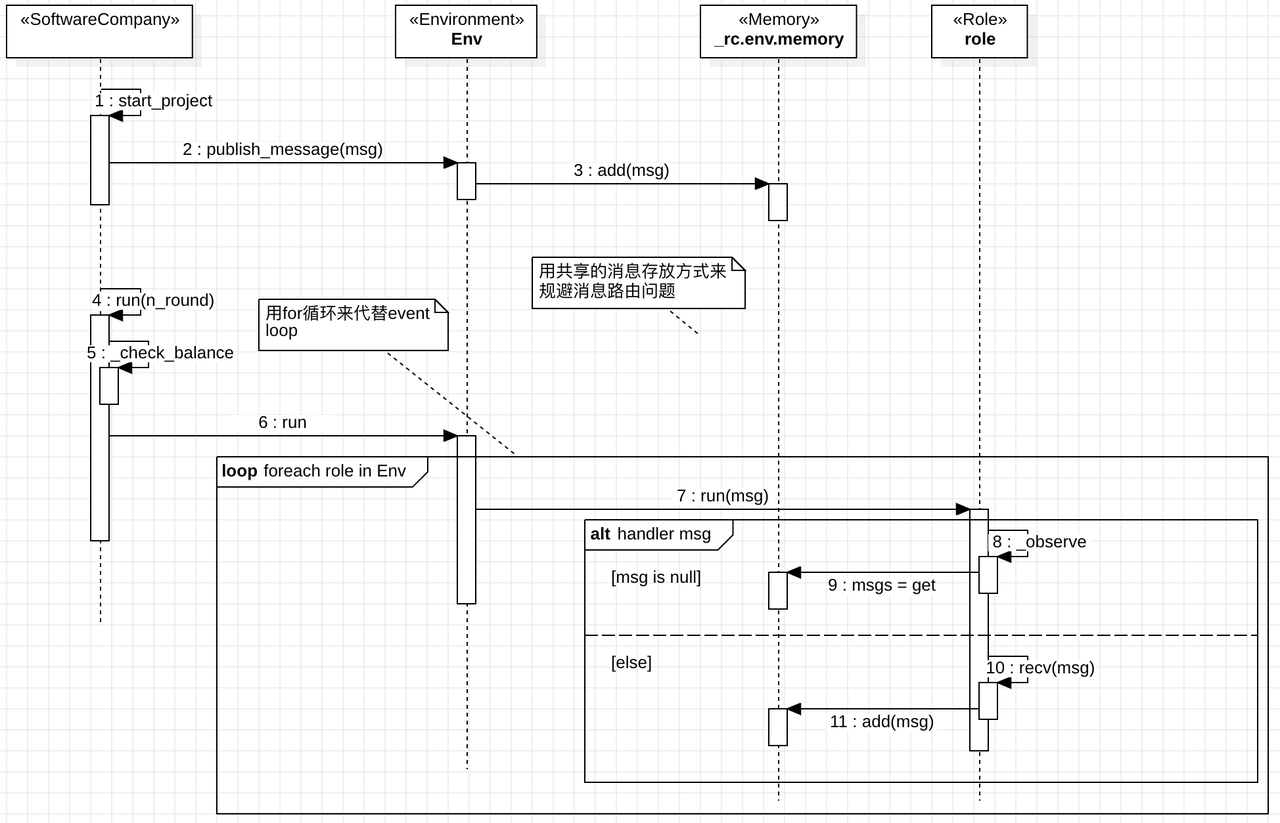
现有设计适合简单、轻量的智能体应用。
在处理持续交互、跨网交互方面存在如下问题:
- 对于多轮场景,超参“n_round”的值难统一、难推荐。比如挖矿场景、软件开发场景。
- 共享式的消息存放不支持跨网的消息消费;
- 共享式的消息存放不支持个性化role对象的记忆压缩和信息隔离,如下图所示:
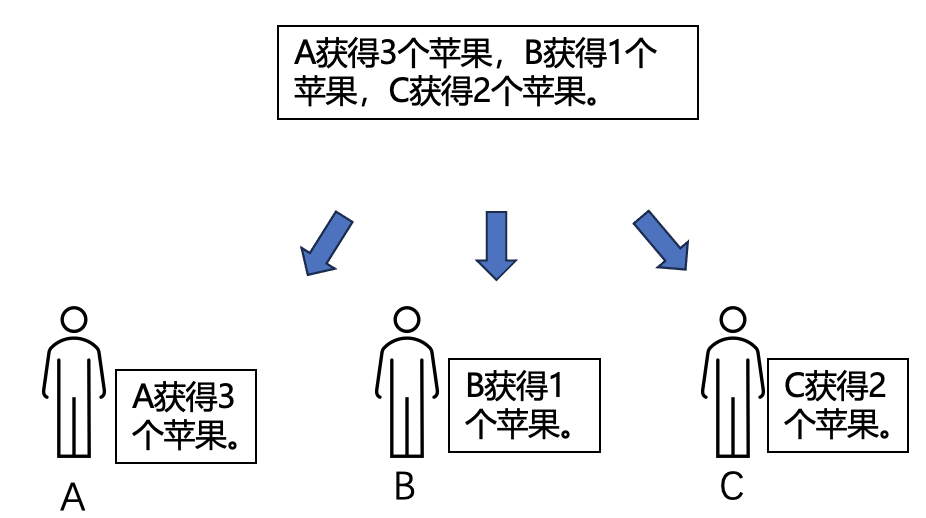
2.1.1.2 新的架构方案
2.1.1.2.1 自适配event loop
新架构中,Env对象的event loop终止的方式为:
- Env对外提供
is_idle状态; - 外部可通过调Env的stop函数来终止event loop;
- 外部通过调start函数来启动event loop。start参数中可指定event loop是否在空闲时自动终止。
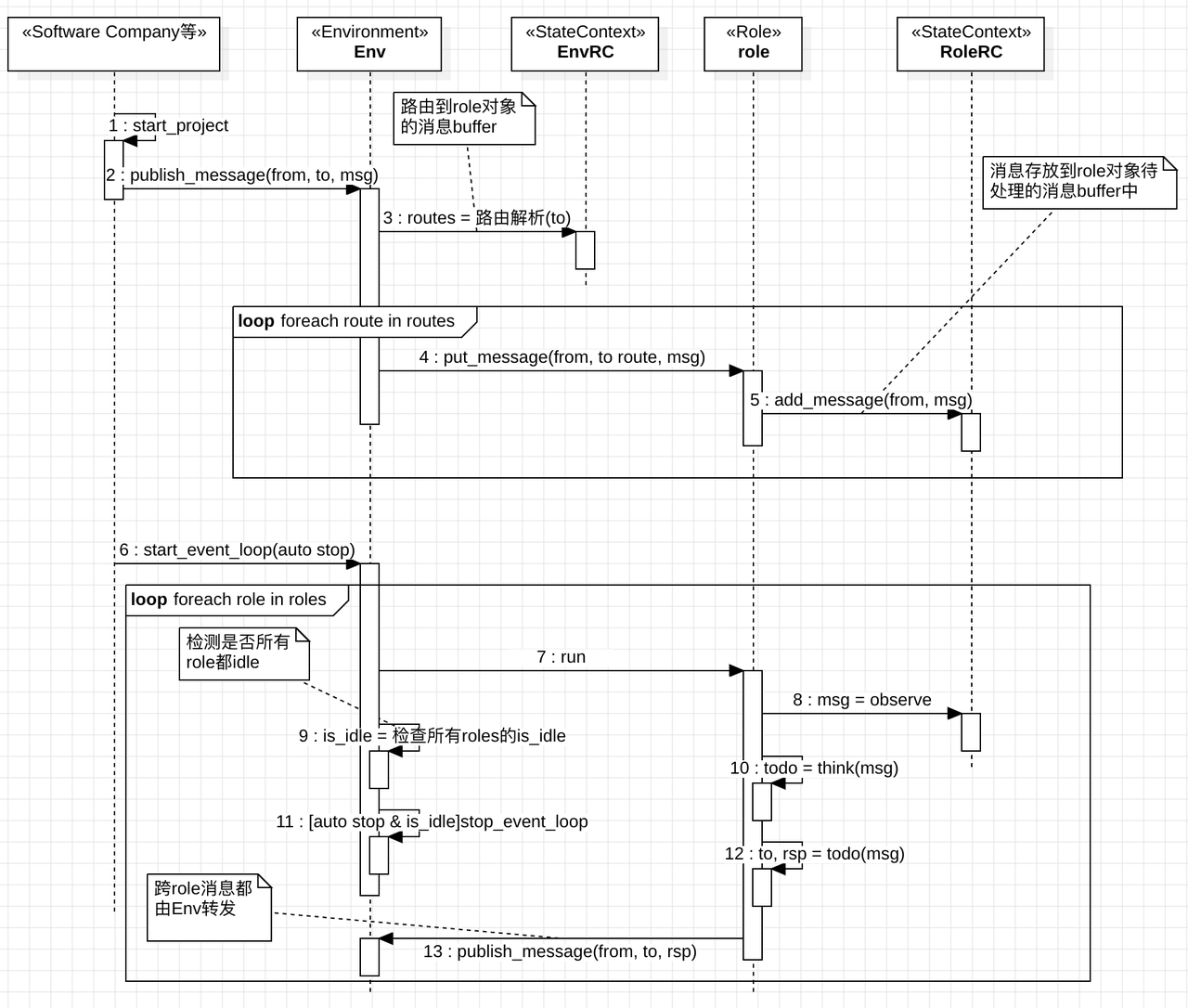
新架构中:
- 所有消息均通过
Environment对象提供的路由功能,将消息存放到各个Role对象私有的消息buffer中; - 所有状态数据都存放到一个支持序列化和反序列化的
StateContext对象中; - Env对象通过检查内部各个role是否都空闲来判断是否需要结束event loop;
- 跨role对象的消息转发统一由
Environment对象负责。
2.1.2 状态数据管理
现状中,并未规范状态数据的存放原则。
新方案中,Role对象私用的状态数据统一存放在Role对象自己的StateContext对象中;跨Role对象的状态数据统一存放在Environment对象的StateContext对象中。
Environment提供save和load函数,用于对Environment对象内部的状态数据存档和恢复。
2.1.3 消息结构
2.1.3.1 现状
现存的消息结构如图所示:
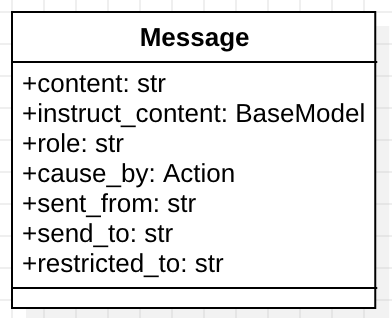
其中:
content用来存放消息内容;instruct_content功能与content相同,区别是存放的是结构化的数据。role是OPENAI规范中定义的role的值,是调LLM的参数的一部分。本质是meta信息的一部分。cause_by被同时用作分类(一种meta信息)标签和路由标签:Pythonasync def _observe(self) -> int: await super()._observe() # accept the very first human instruction (the debate topic) or messages sent (from opponent) to self, # disregard own messages from the last round self._rc.news = [msg for msg in self._rc.news if msg.cause_by == UserRequirement or msg.send_to == self.name] return len(self._rc.news)async def _observe(self) -> int: await super()._observe() # accept the very first human instruction (the debate topic) or messages sent (from opponent) to self, # disregard own messages from the last round self._rc.news = [msg for msg in self._rc.news if msg.cause_by == UserRequirement or msg.send_to == self.name] return len(self._rc.news)sent_from被用作展示时显示的发言者信息。本质是meta信息的一部分。send_to被用作路由参数,用来在从共享消息队列中筛选发给自己的消息:Pythonasync def _observe(self) -> int: await super()._observe() self._rc.news = [ msg for msg in self._rc.news if msg.send_to == self.profile ] # only relevant msgs count as observed news return len(self._rc.news)async def _observe(self) -> int: await super()._observe() self._rc.news = [ msg for msg in self._rc.news if msg.send_to == self.profile ] # only relevant msgs count as observed news return len(self._rc.news)restricted_to被用作群发(一发多)的路由参数,用来从共享消息队列中筛选发给自己的消息:Pythonasync def _think(self): news = self._rc.news[0] assert news.cause_by == InstructSpeak # 消息为来自Moderator的指令时,才去做动作 if not news.restricted_to: # 消息接收范围为全体角色的,做公开发言(发表投票观点也算发言) self._rc.todo = Speak() elif self.profile in news.restricted_to.split(","): # FIXME: hard code to split, restricted为"Moderator"或"Moderator,角色profile" # Moderator加密发给自己的,意味着要执行角色的特殊动作 self._rc.todo = self.special_actions[0]()async def _think(self): news = self._rc.news[0] assert news.cause_by == InstructSpeak # 消息为来自Moderator的指令时,才去做动作 if not news.restricted_to: # 消息接收范围为全体角色的,做公开发言(发表投票观点也算发言) self._rc.todo = Speak() elif self.profile in news.restricted_to.split(","): # FIXME: hard code to split, restricted为"Moderator"或"Moderator,角色profile" # Moderator加密发给自己的,意味着要执行角色的特殊动作 self._rc.todo = self.special_actions[0]()
2.1.3.2 新的消息结构
新的消息结构如图所示:
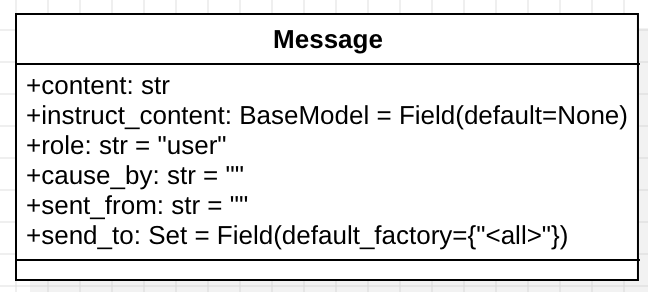
其中:
为了支持
Message类的JSON化,将cause_by的类型替换成str,并封装了自动类型转换的功能;将原来
send_to的str类型改为Set,以支持多标签“或关系”的消息订阅功能。如果Message对象在创建时未设置send_to的值,则默认是全员可接收(与现有公共memory的效果相同)。本次修改,MetaGPT的消息处理参照了消息队列的定义,明确了消息的生产和消费关系。
a. 新框架中,所有
Role类及其子类都是消费者,它们默认订阅了发送给全员、自己对象的类名字、自己对象的name属性值的消息,见缺省的消息订阅标签章。b. 所有
Message对象的创建者都是消息生产者,它们可以通过设置Message对象的send_to的值来调整让谁来消费这条消息。
下面是一些新Message类的使用示例:
- 设置
cause_by属性:
m = Message(content="a", cause_by=Action)
assert m.cause_by == get_class_name(Action)
assert m.cause_by == any_to_str(Action)m = Message(content="a", cause_by=Action)
assert m.cause_by == get_class_name(Action)
assert m.cause_by == any_to_str(Action)- 设置
sent_from属性:
m = Message(content="a", sent_from=Action)
assert m.sent_from == get_class_name(Action)
assert m.sent_from == any_to_str(Action)m = Message(content="a", sent_from=Action)
assert m.sent_from == get_class_name(Action)
assert m.sent_from == any_to_str(Action)- 设置
sent_to属性:
m = Message(content="a", sent_to={"b", Action})
assert m.send_to == {"b", get_class_name(Action)}
assert m.send_to == any_to_str_set({"b", Action})m = Message(content="a", sent_to={"b", Action})
assert m.send_to == {"b", get_class_name(Action)}
assert m.send_to == any_to_str_set({"b", Action})2.1.3.2.1 缺省的消息订阅标签
为了简化业务开发工作,框架默认提供了3种消息订阅标签。 所有Role及其子类都已经订阅了这3种标签,开发者可在发消息时直接使用:
Role对象的name属性:对应Role类及其子类对象的name属性的值。Role类的类名:对应任何Role类及其子类对象的类名。比如"Architect"类的类名为"metagpt.roles.architect.Architect"。- 全员:值为"<all>"。本地所有消费者,都能收到这个消息。
示例如下:
假设有如下几个`Role类`的子类对象:
已知
Python 这里的
Python 这里的
Python 这个消息的接收者为所有群成员。
Python 这个消息的接收者为 |
2.2 MetaGPT需改造的模块
2.2.1 Message结构
参考新的消息结构章节。
新的消息处理框架下,缺省情况下Role类对象会收到所有消息(因为缺省的Message.send_to是全员)。因此Role类的_observe里需要把自己关注的新增消息过滤出来,并以此判断是否有消息需要处理。
代码如下:
async def _observe(self) -> int:
"""Prepare new messages for processing from the message buffer and other sources."""
# Read unprocessed messages from the msg buffer.
news = self._rc.msg_buffer.pop_all()
# Store the read messages in your own memory to prevent duplicate processing.
self._rc.memory.add_batch(news)
# Filter out messages of interest.
self._rc.news = [n for n in news if n.cause_by in self._rc.watch]
# Design Rules:
# If you need to further categorize Message objects, you can do so using the Message.set_meta function.
# msg_buffer is a receiving buffer, avoid adding message data and operations to msg_buffer.
news_text = [f"{i.role}: {i.content[:20]}..." for i in self._rc.news]
if news_text:
logger.debug(f"{self._setting} observed: {news_text}")
return len(self._rc.news)async def _observe(self) -> int:
"""Prepare new messages for processing from the message buffer and other sources."""
# Read unprocessed messages from the msg buffer.
news = self._rc.msg_buffer.pop_all()
# Store the read messages in your own memory to prevent duplicate processing.
self._rc.memory.add_batch(news)
# Filter out messages of interest.
self._rc.news = [n for n in news if n.cause_by in self._rc.watch]
# Design Rules:
# If you need to further categorize Message objects, you can do so using the Message.set_meta function.
# msg_buffer is a receiving buffer, avoid adding message data and operations to msg_buffer.
news_text = [f"{i.role}: {i.content[:20]}..." for i in self._rc.news]
if news_text:
logger.debug(f"{self._setting} observed: {news_text}")
return len(self._rc.news)2.2.2 将公共消息存储改造成Role私有的消息存储
- 取消公共消息存储,改为
Role私有的消息存储。
class RoleContext(BaseModel):
"""Role Runtime Context"""
env: 'Environment' = Field(default=None)
memory: Memory = Field(default_factory=Memory)
long_term_memory: LongTermMemory = Field(default_factory=LongTermMemory)
state: int = Field(default=0)
todo: Action = Field(default=None)
watch: set[str] = Field(default_factory=set)
news: list[Type[Message]] = Field(default=[])class RoleContext(BaseModel):
"""Role Runtime Context"""
env: 'Environment' = Field(default=None)
memory: Memory = Field(default_factory=Memory)
long_term_memory: LongTermMemory = Field(default_factory=LongTermMemory)
state: int = Field(default=0)
todo: Action = Field(default=None)
watch: set[str] = Field(default_factory=set)
news: list[Type[Message]] = Field(default=[])Role中的所有self._rc.env.memory操作变更为self._rc.memory操作。
- 所有消息转发都由
Environment类的Env对象负责。禁止Role对象之间通过访问对方的私有消息存储来交换消息。
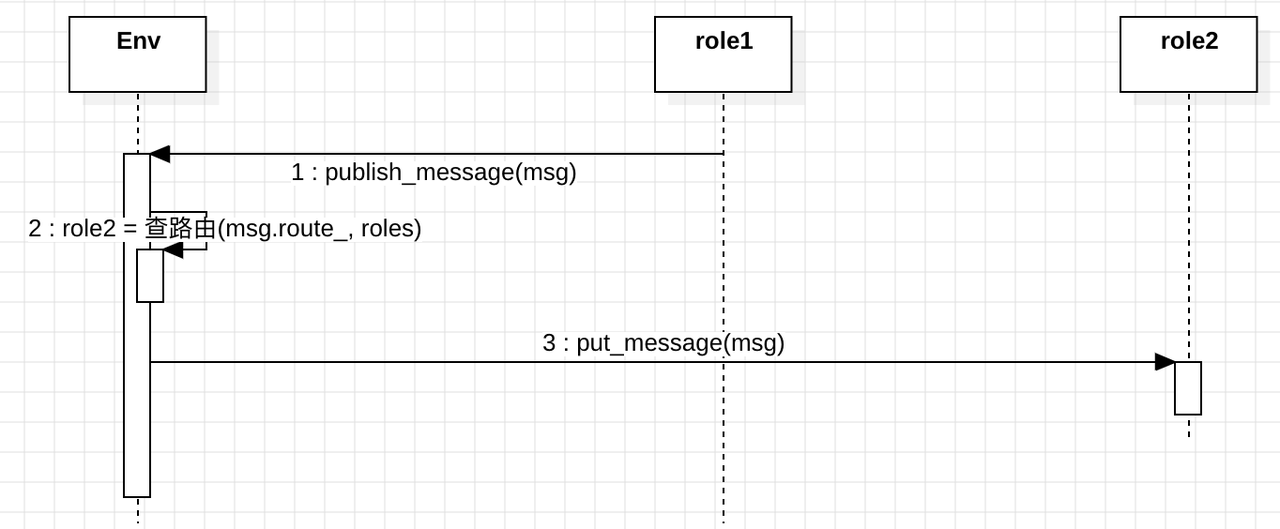
- 所有
Role对象增加一个私有的消息buffer,来接收异步put_message写入的消息。Role对象的observe操作(observe-think-act)需要同时看消息buffer和memory。
2.2.3 取消超参k
目前流程的终止依靠Environment的run的超参k和CostManager的成本超支检查。
async def run(self, k=1):
"""处理一次所有信息的运行
Process all Role runs at once
"""
# while not self.message_queue.empty():
# message = self.message_queue.get()
# rsp = await self.manager.handle(message, self)
# self.message_queue.put(rsp)
for _ in range(k):
futures = []
for role in self.roles.values():
future = role.run()
futures.append(future)
await asyncio.gather(*futures)async def run(self, k=1):
"""处理一次所有信息的运行
Process all Role runs at once
"""
# while not self.message_queue.empty():
# message = self.message_queue.get()
# rsp = await self.manager.handle(message, self)
# self.message_queue.put(rsp)
for _ in range(k):
futures = []
for role in self.roles.values():
future = role.run()
futures.append(future)
await asyncio.gather(*futures)新的流程终止条件改为所有的self.roles对象的think都为空(Role对象私有的消息buffer为空,且无action),或者成本超支。
2.2.4 规范状态数据的存储
- 新建一个支持序列化和反序列化
save/load的StateContext类 - 所有状态数据都需要放到这个类对象中。
- 仅限
Environment类和Role类拥有这个类的对象。